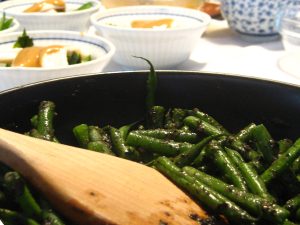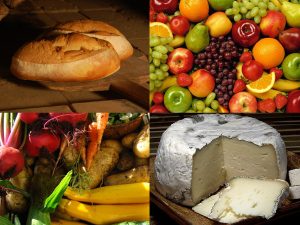Farmers’ markets / direct farm sales - introduction

“In every country on earth, the most human scenario for farmers is likely to be feeding those who live nearby-if international markets would allow them to do it. Food transport has become a bizarre and profitable economic equation that’s no longer really about feeding anyone … If you care about farmers, let the potatoes stay home.” – Barbara Kingsolver
Contents
What are farmers’ markets and direct farm sales?
They’re ways for farmers to sell direct to local people, without having to go through an exploitative supermarket system.
You either go to a market where lots of local food producers have stalls, or to an individual farm, to buy directly from their shop – or maybe there’s the possibility to actually get onto the farm and pick your own. Some farms may have a café or a home delivery service, or even vending machines and honesty boxes, but whatever schemes farmers have, it’s a way to get local food inside local people via the direct route.
The produce on sale could be raw and unprocessed – fruit, veg, meat, eggs – but also baked goods, pickles, jams, sauces, cheeses, smoked foods, dried meats and fish, cooked dishes etc.

History
Of course, local food markets and farm sales go back almost as far as agriculture. Produce has always been bartered or swapped for some exchange medium that could then be swapped for different produce. All markets were ‘farmers’ markets’ until the advent of corporate supermarkets, and in many parts of the world today, trying to explain farmers’ markets or direct sales in terms that depict them as in some way out of the ordinary will confuse the locals, who just call them markets. Their local markets provide affordable, high-quality food, and they’re proud of their local cheeses, beers, wines and other specialities. The global trend is towards corporate dominance of our food supply, however, which makes the recent counter-trend towards local food and direct sales all the more important.
The first of the new wave of farmers’ markets in the UK was established in 1997 in Bath, and now there are more than 550 farmers’ markets in the UK.
There are some traders at farmers’ markets who are not farmers – like bakers, smokers, picklers, jam-makers, cheesemakers, brewers etc., but they should source their ingredients from local farmers.

The Farm Retail Association is a support organisation for direct farm sales, and they provide a certification scheme for farmers’ markets, to ensure that what you are looking at is a ‘real’ farmers’ market. Here are their ten principles of a real farmers’ market:
- Audited: the markets are independently audited.
- Champion the farmers: ensure that customers get to buy directly from the people who grew and produced the products on sale.
- Insured: all traders and markets must have suitable public, product, and employment insurance in place to protect their customers.
- Knowledgeable: the person selling understands how the food has been produced from seed to plate.
- Legal: all traders and markets must follow all relevant laws and bylaws.
- Local businesses: markets recruit stallholders from as close to the market as possible.
- Locally sourced: ingredients sourced by a producer are found as locally as possible to the market and producer.
- Produced by the seller: consumers can only buy items produced by the business that is also selling it.
- Promoted: the market clearly talks to its customers about the products and farms.
- Well managed: the market organiser and/or organisation has systems and processes in place to ensure that the above principles are enforced at all times.

What are the benefits of farmers’ markets and direct farm sales?
Personal
Farmers get to keep more of the income generated and are able to escape from exploitative supermarket contracts. They can reduce costs via less packaging, and no transport costs for farm shops and PYO; and at the market, there are opportunities to receive feedback directly from the public. Consumers get better-quality, fresh, local, seasonal food, they get to meet the people who produce their food, and have a much more pleasant and interesting experience than supermarket shopping; and pick-your-own is cheap, and a nice way to spend an hour or two.

Decentralising power away from corporations
Shopping at farmers’ markets or farm shops cuts off the flow of money and therefore power to corporations – it helps to loosen their grip on our food supply, and therefore reduces their wealth and their ability to pervert democracy and push for biosphere-destroying growth.

Building community and preparing for any potential collapse scenarios
We all need food – but if national and global supply chains break, we’ll need to grow it or forage it ourselves, or have a market for local producers. Local markets keep more wealth in communities, increase local resilience and national food security. They also provide more jobs. Between 1948 and 1989, the UK agricultural labour force declined by 70%, as farms got bigger, more machinery and chemicals were used, and markets became oriented towards the national and international rather than the local.
Environment
Produce hasn’t been transported very far, with little or no packaging and less refrigeration; less is wasted – because of supermarkets’ preference for perfect-looking fruit and veg. Local markets counteract the intensification of agriculture – they help small, mixed farms, rather than large, monoculture farms. Small, mixed farms can utilise animal manure on crops, and a varied, rotating crop doesn’t give pests a chance to become established, so fewer or no pesticides are required, which means pest predators aren’t killed.

Prices
A word about prices. It’s unfortunate, but those who want to help create a better world are always charged more than people who don’t. Hence flying is cheaper than driving, which is cheaper than taking the train; recycled products are more expensive than non-recycled; organic is more expensive than non-organic, and so on. It’s equivalent to a tax on doing the right thing – which can’t be right, surely?
Having said that, see here, especially ‘Research has shown that much fresh produce is actually more expensive at supermarkets. With organic food, the price difference is striking: meat and poultry was found to be on average 37% more expensive at the supermarket, and vegetables were 33% cheaper at farmers’ markets’.
Even when locally-produced, sustainable food is more expensive, it’s worth a bit extra to do the right thing if you can, isn’t it? And you might have had the ‘local food is too expensive’ conversation with someone with a giant TV, two cars on the drive and £150 trainers. In the end, it’s a question of priorities, and what kind of world we’d like to see. But for some, farmers’ markets are too expensive, and for those people, we want to help grow the commons economy to provide affordability in other areas of life, as well as better jobs.
One more point – if local food is more expensive than corporate food, it will mean more money for local food producers, so more money in your local community, which will give more opportunity for people to start other local businesses, one of whom might be you. A rising tide lifts all boats.
What can I do?
Consumers
- Find your local farmers’ market or direct sales outlet: there are sites with maps, where you can find your nearest local food sources. See here and here for example; and here‘s a listing, by county, of pick-your-own farms in the UK – or you could just search online for farmers’ markets, farm shops, pick-your-own and the name of your town.
- Use them: some people might be attracted to farmers’ markets and direct sales because of the novelty value. Far better to develop relationships with local food producers and wean ourselves off supermarkets, whose policies damage farmers, the environment and ultimately, society. Local food producers need support all the time, not just for a few months.

Farmers / smallholders
- Talk to the Farm Retail Association about selling to the public directly (including about insurance). They can help you set up a shop, cafe, pick-your-own, market stall – whatever works for you. Here are some tips on setting up a farm shop.
- Talk to your local authority’s planning department about registration and planning permission for a farm shop. Some things come under permitted development, including the change of use of a building, but not things like selling processed meats.
- Talk to your local authority’s environmental health department about legislation and licensing required for selling direct to the public.
- Contact the Food Standards Agency for advice on food safety, hygiene and labelling, and/or a butchery licence.
- Contact your local building control team to talk about fire safety for a farm shop.
- For any kind of direct sales, contact Trading Standards for trades descriptions, weights and measures and the sale of goods.

Futher resources
- Farm Retail Association – find farmers’ markets and farm shops
- Information Britain – farmers’ markets in the UK
- Farmers’ Market Manual (pdf) – lots of useful info








